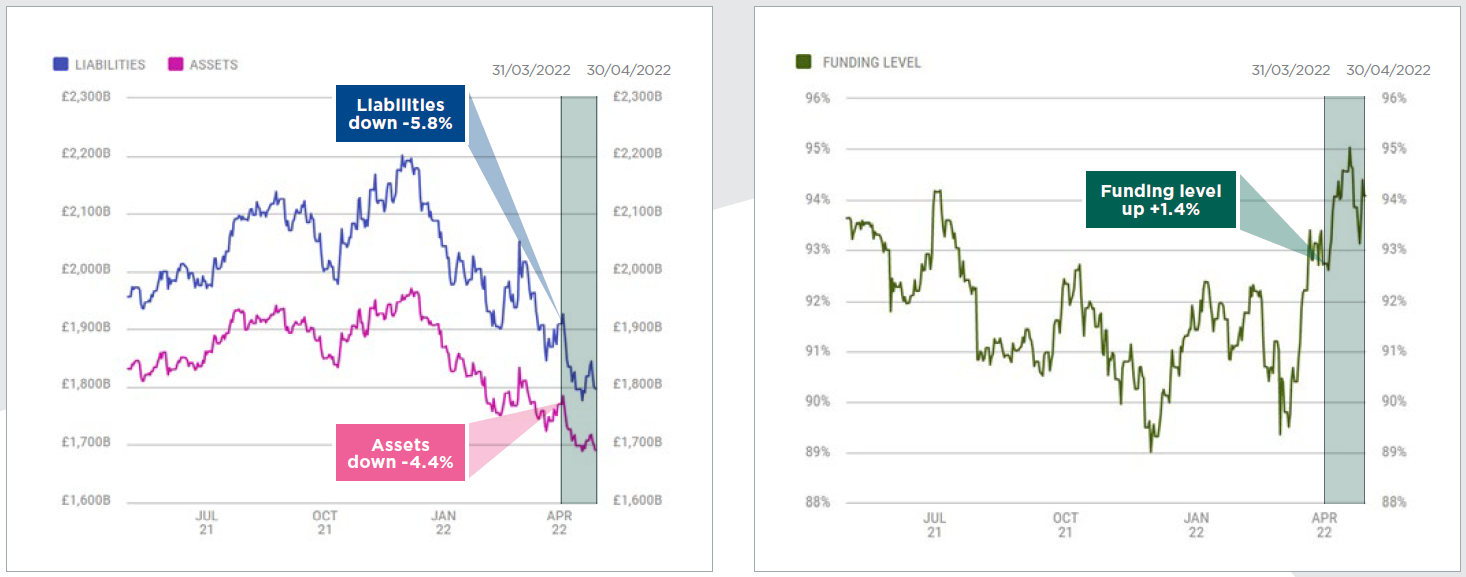Markets continue to experience a tough start to 2022
Markets continue to experience a tough start to 2022
06 May 2022
View PDF here
Month in brief
- UK gilt yields hit a 3-year high as inflation continues to soar and the market prepares for further monetary policy response
- In early May the Bank of England increased the bank rate by 0.25% to 1%
- War in Ukraine continues to cast a shadow over global equity markets which continued their volatile start to 2022
- A new wave of Covid outbreaks in China and the news that the US economy shrank by 1.4% in the first quarter compounded fears of a possible global recession
Many of the key themes of the first quarter of the year persisted in April as markets continued to stutter. War in Ukraine continues to dominate the headlines.
Major market indices finished April in negative territory against the backdrop of rising inflation, continued conflict in Ukraine, a new wave of Covid outbreaks in China and the news that the US economy unexpectedly shrank in the first quarter of 2022.
In the UK, CPI reached 7.0% in the 12 months to March 2022, the highest since this measure of inflation began in 1997. US inflation climbed to 8.5%, now a 40- year record high. In early May, the Bank of England voted to raise the base rate by 0.25% and the Federal Reserve raised US interest rates by 0.5%. Long term inflation expectations remain elevated despite having fallen slightly over April. Both fixed interest and index linked gilts delivered negative returns, with index linked gilts performing particularly badly given these factors are amplified by the long maturity of index linked gilts.
In Europe, Bulgaria and Poland saw their gas supplies cut off by Russia for their refusal to pay in Roubles – a demand made by Russia in an attempt to prop up its sinking currency as a response to Western economic sanctions which have sought to cripple its value. The move sparked debate by EU member nations on how to remove reliance on Russian oil and gas supplies and increased fears that a European-wide energy crisis lingers on the horizon. Russia continues its advance into Ukrainian territory on its eastern border.

Elsewhere on the continent, incumbent Emmanuel Macron was victorious in the French Presidential election defeating far-right contestant Marine Le Pen to earn a second term.
Lockdowns in China weighed heavy on prospects for global economic growth with Asian, European and US stocks all suffering from fears that lockdowns in Shanghai and possibly Beijing could damage global supply. Oil prices also fell dramatically on the prospect of weaker demand from the world’s second largest economy.
Analysts had predicted a 1% rise in US GDP in the first quarter and were shocked by the news that it had actually fallen by 1.4%. Fears that the US could fall into recession were allayed by the news that consumer spending (which accounts for around two-thirds of the US economy) rose by 2.7% during the quarter with many of the downward pressures on the US economy expected to reverse later in the year.
Credit spreads rose for both investment grade and high yield corporate bonds reflecting the wider economic concerns impacting bond markets.
The aggregate funding position of UK DB pension schemes improved modestly over the month due to rising gilt yields reducing the present value of long-term liabilities. Risk assets underperformed however, offsetting some of the gains.

Source: XPS DB:UK www.xpsgroup.com/services/xps-pensions/xps-dbuk-funding-watch
For further information, please get in touch with Ben Wright.
- Register for events
- Join our mailing list
Register for events
We enjoy hosting a wide range of events for pension scheme trustees, corporate sponsors, independent trustees, and pensions professionals.
Join our mailing list
Keep up to date with our latest news and views including pension briefings, XPS insights, reports and event invitations.



